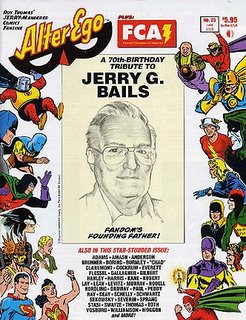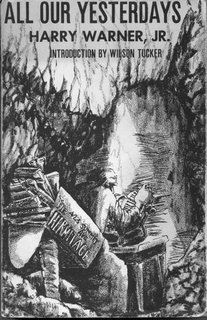But however much I learn from and understand those stories, there is simply a finite amount of information that I can uncover. I am inherently limited by the published stories and, many though they are, everything there is currently to know about She-Hulk, as a character, has been published. There are holes in the character's lives to be sure, but they're holes because those portions of those lives simply don't exist. What did Thor do on his 250th birthday? Could have been anything. But, more to the point, it still can be anything. Until and unless a comic book writer decides to develop that story, it simply isn't a part of the character's history.
So with that said, I have had two interests in comics that I think will sustain my interest in the medium for the rest of my life. First is the history of the comics themselves. How exactly did Martin Goodman get his information about the success of the Justice League of America, and how did Stan Lee and Jack Kirby take that concept to come up with the Fantastic Four? There's some commonly held beliefs about these types of things, naturally, but no one really knows for sure. Which means that I can spend the rest of my life studying arcane bits of data to uncover the real story behind the story.

The other thing about comics that fascinates me is comics fandom. What possesses someone to read a comic book month after month for years, if not decades, on end? What kind of mentality prompts someone to create a costume and regularly dress up as a fictional hero? Why do people pay thousands of dollars for deteriorating paper that was created years before they were even born? Why am I sitting here at a computer terminal, writing a daily blog about comics when I can easily think of a dozen other more productive things I could be working on?
The picture at the right is that of Jerry Bails, often considered the founder of modern comics fandom. In the late 1950s and early 1960s, he did a lot of letter-writing and fanzine publishing that pulled people together from across the United States (and, I expect, the world) by linking them through their hobby. I talked with Jerry back in 2004 and much of his intent in those early days was simply to help connect fans. So he hopped from project to project, helping to get them started and passing them along to someone else soon after.
 Right now, I'm reading a history of science fiction fandom up through the 1950s called All Our Yesterdays by Harry Warner, Jr. originally published in 1969. My initial thought was that -- given the lack of published material on comics fandom -- there might be a handful of analogies in science fiction fandom that might prove insightful. What I've found so far, though, is that the two types of fandom were nearly identical in most respects! The same types of groups sprouted up in exactly the same way in not-dissimilar locations. The same types of people gained prominence and notoriety, and the same types of people caused the same types of rifts within the communities. The only significant differences seem to be the names and the dates. It is indeed proving more insightful than I might have guessed.
Right now, I'm reading a history of science fiction fandom up through the 1950s called All Our Yesterdays by Harry Warner, Jr. originally published in 1969. My initial thought was that -- given the lack of published material on comics fandom -- there might be a handful of analogies in science fiction fandom that might prove insightful. What I've found so far, though, is that the two types of fandom were nearly identical in most respects! The same types of groups sprouted up in exactly the same way in not-dissimilar locations. The same types of people gained prominence and notoriety, and the same types of people caused the same types of rifts within the communities. The only significant differences seem to be the names and the dates. It is indeed proving more insightful than I might have guessed.I'm also looking forward to receiving the recently completed documentary on the fans of Joss Whedon's Firefly and Serenity called Done the Impossible. I think the comparisons among the comic book meidum, the science fiction genre, and the Serenity sub-genre should prove most intriguing. The documentary debuted at WonderCon recently (but I have yet to see a review of it) and they claim that they're mailing out the DVDs as soon as they can get them burned.
Where am I going with this post? Well, as we're still in the early days of my blog here, I think it makes sense to establish the "ground rules" of what you can expect to read about. Sure, my blog has "Comics" in the name, but that's still a wide subject to focus on. With these initial posts, I'm trying to establish what I consider fair game for this blog and some of the background of how I'm approaching the subject.






0 comments:
Post a Comment